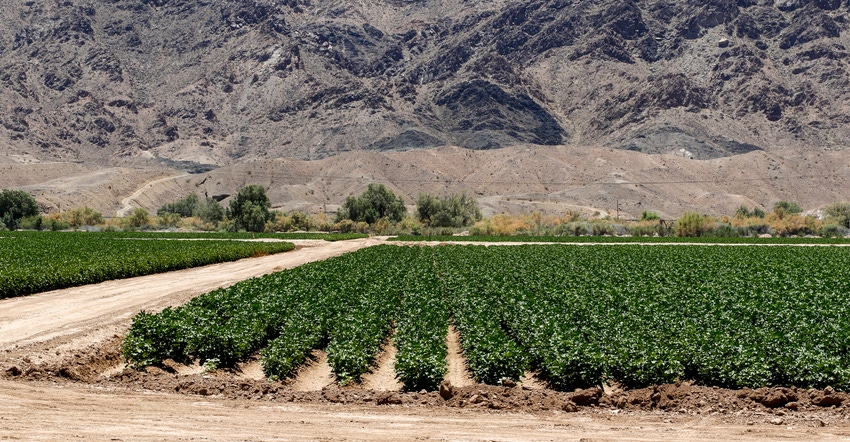
Cotton acreage in California and Arizona are down significantly as poor grower prices and water availability victimizes producers.
California cotton producers planted 28 percent fewer acres of the fiber crop this year while their neighbors in Arizona planted nearly 22 percent less acres. Arizona cotton grower Greg Wuertz of Casa Grande said his decision to plant fewer acres this year was largely due to water availability to irrigate his crop. Wuertz is the Farm Press 2020 High Cotton winner from the West.
Reports in California suggest some long-time cotton farmers opted not to plant any at all earlier this year due to a decision by the U.S. Bureau of Reclamation to significantly limit federal water deliveries and the likelihood of unprofitable returns.
California
Pima varieties remain the most popular among growers at nearly 146,000 acres statewide, compared to 25,645 acres of Upland. Still, this is down 28 percent from the previous year, according to the California Cotton Ginners and Growers Association. Overall cotton acreage is also down 28 percent to just over 187,000 acres.
Kings County remains the most popular location to grow cotton in the state, with nearly 87,000 total acres. Of this, just over 77,000 is in extra-long staple varieties. California once grew over 1 million acres of Pima cotton.
ELS cotton has long been a popular type for California growers as the weather favors the longer-season varieties and soil conditions on the west side of the San Joaquin Valley can push Pima yields nearly as high as those of Upland varieties. Growers who can achieve such yields tend to do better under pricing that tends to favor the ELS varieties.
The soil types and climate conditions that tend to favor Pima production include Kern at 9,215 acres this year, Kings at 77,170 acres, Fresno at 31,905 and Merced at 26,305 acres.
Most of California's cotton production remains in the San Joaquin Valley. Just over 171,000 acres of cotton is grown there this year. The Sacramento Valley has just over 3,000 acres of Upland varieties while the low deserts of Riverside and Imperial counties have just under 13,000 acres of Upland cotton this season.
Cotton harvest in the low desert regions of the state will begin soon as growers there prepare to plant winter vegetable crops as the seasonal transition of produce moves south from the Salinas Valley.
Arizona
Unlike California, Arizona growers plant the short-staple varieties in greater volumes because they can consistently get higher yields from Upland varieties versus the Pima. For growers in the Yuma area, the shorter-season cotton varieties are critical to crop rotation planning as that crop tends to go in early and needs to come out in late summer as growers in that region work to convert land to winter vegetable production in September and October.
According to the Arizona Cotton Research and Protection Council, total cotton acreage in 2020 is over 128,000 acres, or nearly 22 percent off last year's figure of just over 164,000 acres. Over 122,000 acres of Arizona's total is devoted to Upland varieties.
About the Author(s)
You May Also Like






